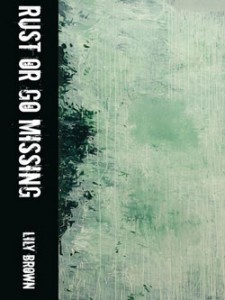Book Review
 Despite the quasi-Darwinian title of Rust or Go Missing, which recalls a socio-biological ultimatum (eat or be eaten, fight or flight), the poems of Lily Brown’s debut full-length collection risk utterances that make belief an appealing, if not necessary, episteme again. Speech does more than just “center our backs” in this profoundly subtle, sleight-of-hand collection—it frames the risky endeavor of becoming human in a discourse community as a linguistic act, one capable of staving off the inconsequence of humanity in a post-human world. From “Greeny”:
Despite the quasi-Darwinian title of Rust or Go Missing, which recalls a socio-biological ultimatum (eat or be eaten, fight or flight), the poems of Lily Brown’s debut full-length collection risk utterances that make belief an appealing, if not necessary, episteme again. Speech does more than just “center our backs” in this profoundly subtle, sleight-of-hand collection—it frames the risky endeavor of becoming human in a discourse community as a linguistic act, one capable of staving off the inconsequence of humanity in a post-human world. From “Greeny”:
We become obsolete, not or else.
At the edge a turquoise line extends.
It’s painting, but pretend
it’s something else. At the edge
tundra green bumps sky purple
bumps sand bumps ocean grey
bumps red, fiery red above. At the edge
we walk. Pale interstices. Waves deafen
and flatten. Be honest. In the painting,
there are mountains.
In these pages, the inscription of and desire for speech and presence have the reader on tenterhooks amid screams at the “lyric maker” by the speaker to “Expose / my insides!” This same speaker more characteristically exhibits a level of formal constraint that ranges from Kantian disinterest to a flurried range of polysemic self-definitions so dense in allusion the overall effect is virtuosic: “Conversation’s cobbled / from complaint. When none remain // I am a case complete.” The wealth of pluralistic definitions sets this collection apart (“We // pass. Sideways, we are / bodies; one dimension, // being moved”) and occasions a new theory of relationships and of gravity: “When I say we I don’t mean / we’re the same. I mean // we fall on each other.”
Everything about the lyric body here also becomes a meditation on and metaphor for the text—the corollaries bear out from the surface/face to the spine/back with “insides” linked to content, though said “insides,” as in the poem “Transference,” undergo more slings and arrows by the world than one might imagine: “I’ve let you box my insides,” says the speaker, one of the collection’s many cool statements that cuts deeper for its reference to that part of the body or text (e.g., meaning or sense) not readily available for interaction or view.
Unlike many other first collections wherein many of the poems or lines feel off-handed or blasé in accordance with the tonal register of the day, the speaker of Rust or Go Missing loads her spare, heavily enjambed stanzas (if there are end-stopped lines they are often composed of two or three words) with a sense of constant urgency, the stakes being those of actual survival.
In preparation for these experiments in language and perception, the reader is asked to reconsider the weight given to speech, which the Greeks valued over writing but systematically devalued with the slow rise and domination of print culture (and its digital analogs) along with other rhetorical arts. From “On Reading”: “I was working / on my speech / when the shower / head said, Speak / man. The sickness / said, You thought / to make speech / less devastating and this is / punishment.” As with other poems in Rust or Go Missing, this pronouncement has just a touch of the vatic, which is to say the timeless, while placed in an often generalized and/or economized contemporary frame. Again, from “Sensed”: “I separate. Try to / in the speech act. / How successful. / Hair flouts head.”
A reader of this in many ways astonishing first collection would be remiss not to acknowledge the many nods to Wallace Stevens that range from the epigraph to the style, form, and lavish monument many of these poems make to the imagination and the idea of finitude and finality.
From “Leaf at the End”: “I climbed a giant leaf at the end / of my imagination. // The imagination asked for all the cities, / for the canopy to get its machines out / and tile the leaves. // Up in the canopy I dangle, touching nothing.” This seeming remoteness, while beguiling, is not ultimately the speaker’s element, however. Whether framed in terms of industry and conscience (“I work hard / to rearrange the sand // when I do wrong”) or euphoria and willpower (“How easy to be giddy: / when faced with nightmare, stare it down”), the speaker of this collection conceals moments of illumination and hope so far up her sleeve that the reader must search for them amid the wreckage of past lives, the detritus of nature and the intractability of natural and man-made laws—but this search is rewarded with what Stevens calls “a new knowledge of reality” wherein what is missing or dead is restored: “A tree dies alone, / wounded up the trunk. / As if compression. / As if amputation. / We might keep the tree / and this the first, world I love.”
Rust or Go Missing asks much from its reader by way of close reading and re-reading, but the pleasures of the text belong to that rare species of poetry collections whose value extends infinitely beyond the memes of information and culture to those of literature and resists easy incorporation. It is a collection to be turned over slowly in one’s mind and handled with care.